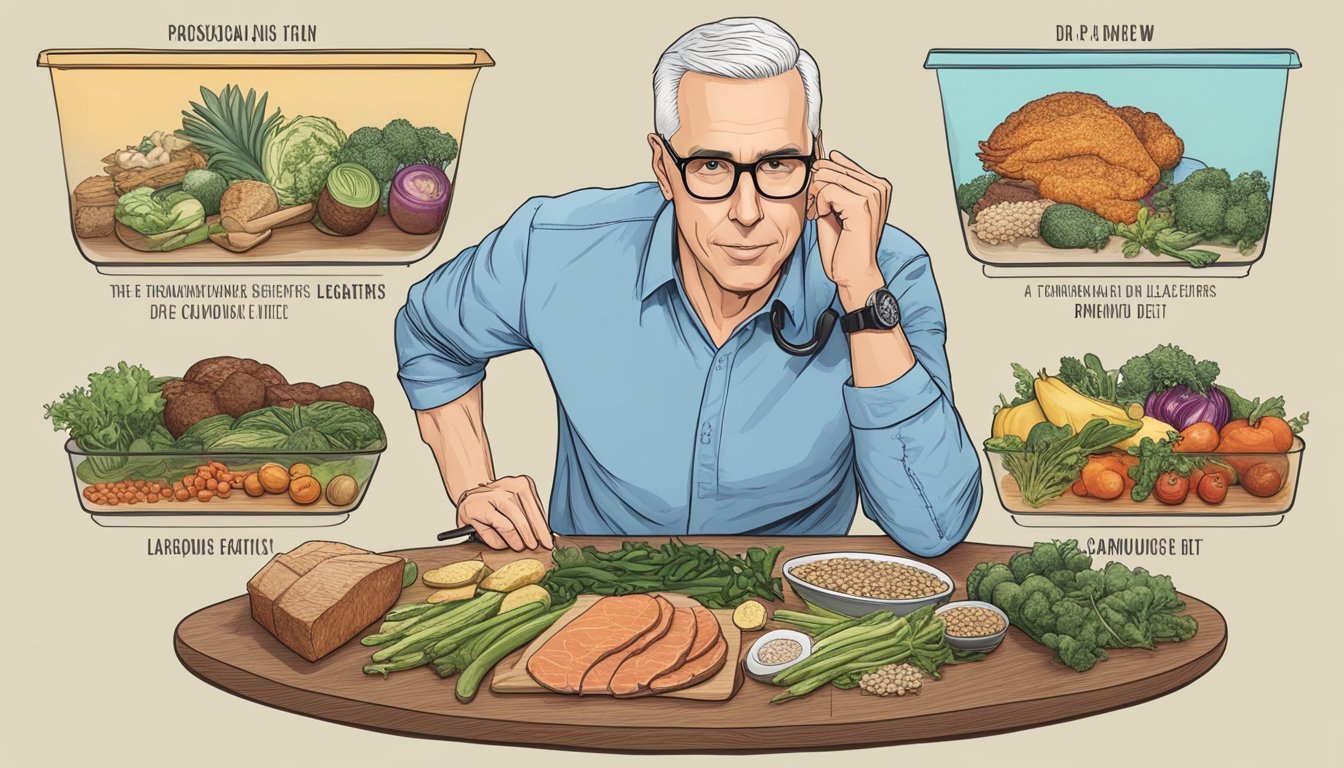Dr. Drew Pinsky Carnivore Diet Insights
Evaluating Health Impacts
Dr. Drew Pinsky, a well-known physician and media personality, experimented with the carnivore diet, a regimen that involves consuming only meat and animal products. He reported significant changes to his health and well-being as a result of this dietary shift. This meat-only approach to eating is a variation of the ketogenic diet, which traditionally includes high-fat and low-carbohydrate foods, but the carnivore diet takes it a step further by eliminating all plant-based foods from one's meal plan.
The carnivore diet's rising popularity comes with claims of various health benefits, including weight loss, increased energy levels, and enhanced physical strength. Dr. Pinsky's personal experience with the diet yielded a noticeable improvement in his energy and a substantial weight reduction. However, this type of diet is not without its controversies. Experts often debate its long-term health implications due to the exclusion of fruits, vegetables, and grains, which are conventional components of a balanced diet and important sources of fiber, vitamins, and minerals.
While the carnivore diet is praised by some for its potential health benefits, it is essential to approach it with caution and consider individual health needs and medical advice. The experiences individuals like Dr. Pinsky share highlight the importance of personal experimentation and adapting to one's own nutritional requirements while also pointing to the need for more research on the diet's long-term effects on health.
Dr. Drew Pinsky and the Carnivore Diet
Dr. Drew Pinsky, a well-known doctor and media personality, has made headlines by experimenting with the carnivore diet, an all-meat eating regimen.
Who Is Dr. Drew Pinsky?
Dr. Drew Pinsky is an American board-certified internist, addiction medicine specialist, and media personality. He gained fame through his work on radio and television, most notably on "Loveline" and "Celebrity Rehab with Dr. Drew". Pinsky's medical expertise and straightforward approach to health and addiction have made him a respected figure in the medical community.
Dr. Drew's Connection with the Carnivore Diet
Pinsky explored the carnivore diet, which is a restrictive ketogenic diet that consists solely of meat and animal products. This diet excludes other food groups, emphasizing weight loss and purported muscular gains. Pinsky's personal experience with the carnivore diet, according to public statements and shared through various media outlets, suggested a positive change in his energy levels within days of starting the diet.
The carnivore diet has also been associated with other public figures such as:
Shawn Baker: An orthopedic surgeon and a proponent of the carnivore diet, advocating for its benefits.
Jordan Peterson: The clinical psychologist reported improvements in mental health and physical health on a strict carnivorous diet.
Joe Rogan: The popular podcast host has discussed the carnivore diet on his show, noting the diet's impact on his own health and wellbeing.
While figures like Pinsky and others have endorsed the carnivore diet's benefits, the diet remains controversial, and some health professionals highlight potential risks associated with such a restrictive plan.
Understanding the Carnivore Diet
The Carnivore Diet is characterized by an exclusive intake of meat and animal products, eschewing traditional food groups like carbohydrates. It has gained attention for its simplicity and potential health impacts.
Fundamentals of the Carnivore Diet
The Carnivore Diet revolves around the principle of consuming only animal products—predominantly meat. Proponents suggest it can lead to weight loss and muscle gain. Unlike diets that incorporate a variety of food groups, those following this regimen consume no fruits, vegetables, nuts, or seeds. This diet is high in protein and fat, but nearly void of carbohydrates, which can lead to a metabolic state known as ketosis; a process in which the body burns fat for fuel in the absence of carbohydrates.
Daily Foods Include:
Red meat (like steak)
Poultry
Fish
Eggs
Limited dairy
Excluded Foods:
All forms of carbohydrates
Sugars
Fibers
Carnivore Diet vs. Other Diets
The Carnivore Diet differs significantly from other popular diets like the keto diet or the paleo diet. Keto focuses on low carbohydrate intake but includes a broader spectrum of food, including vegetables and dairy, to maintain ketosis. On the other hand, paleo encourages consumption of whole foods and avoids processed foods and sugars but still allows fruits and some root vegetables.
Comparison Table:
Carnivore Diet
Foods Consumed: Meat, fish, eggs, some dairy
Carbohydrates: Almost none
Keto Diet
Foods Consumed: Meat, fish, eggs, vegetables, dairy
Carbohydrates: Low, to maintain ketosis
Paleo Diet
Foods Consumed: Meat, fish, eggs, fruits, vegetables, nuts
Carbohydrates: Moderate, avoiding processed foods
The main distinction lies in the absence of plant-derived foods within the Carnivore Diet, positioning it as a meat-only diet with potential health implications that vary from individual to individual.
Health Benefits and Risks
The carnivore diet, where one consumes solely meat, is gaining attention for its impacts on health. This diet often triggers discussions regarding its effectiveness for weight loss and muscle gain, as well as its potential impact on energy levels and cravings. However, dieticians and healthcare professionals raise concerns over possible health risks, especially when it comes to the absence of essential micronutrients typically obtained from a more varied diet.
Potential Health Benefits
Weight Loss: Some individuals report significant weight loss when adhering to the carnivore diet. The restrictive nature of the diet may contribute to an overall reduction in calorie intake.
Reduced Cravings: The high-protein content of the diet may lead to reduced cravings, as proteins are known for their satiating effect.
Increased Energy Levels: Individuals like Dr. Drew Pinsky have reported increased energy levels after a few days on the carnivore diet.
Muscle Gain: The diet's high protein content, which is crucial for muscle repair and growth, may be beneficial for those looking to increase muscle mass.
Possible Health Risks and Criticisms
Health Risks:
Heart Disease: The high intake of saturated fats from meats can lead to an increased risk of heart disease.
Lack of Micronutrients: A strict meat-only diet may lead to deficiencies in essential micronutrients typically found in fruits, vegetables, and grains.
Criticism from Health Professionals:
Nutritional Imbalance: Experts emphasize the importance of a balanced diet that includes a variety of foods to obtain all necessary nutrients.
Long-Term Effects Unknown: There is a lack of long-term studies on the safety and efficacy of the carnivore diet, which leads to skepticism and caution from the medical community.
Diet Implementation
When embracing a significant dietary change such as the all-meat diet, attention to detail and thorough planning are vital for a successful transition. The Carnivore Diet, which Dr. Drew Pinsky reportedly experienced positive results from, focuses on consuming animal products exclusively and eliminates vegetables and other plant-based foods.
Getting Started with the Carnivore Diet
Individuals considering the Carnivore Diet must first prepare for a lifestyle that eschews the conventional consumption of fruits, vegetables, and grains, pivoting to a nutrition framework centered around animal products. The diet's emphasis on meats means one's kitchen and meal planning must adapt accordingly. It's recommended to consult with a healthcare provider before starting, especially for those with pre-existing health conditions.
Phase 1: Elimination of all plant-based foods
Phase 2: Introduction of a range of meats, fish, and animal fats
Phase 3: Monitoring individual responses to dietary changes
Water intake remains crucial, and adherents should ensure they stay well-hydrated.
What to Eat on the Carnivore Diet
The food selection on the Carnivore Diet is straightforward yet requires a keen focus on nutrition and variety to meet one's health needs. Steaks and ground beef often become dietary staples due to their accessibility and nutrient density.
Protein Sources:
Beef: steaks, roasts, ground beef
Poultry: chicken, turkey
Pork: chops, bacon
Fish: salmon, mackerel, sardines
Eggs
Fat Sources:
Fatty cuts of meat
Butter and ghee
Fish, for its omega-3 fatty acids
Contrary to a standard diet, vegetables and other sides are omitted entirely, which might lead to micronutrient deficiencies if not carefully managed.
By adhering to these guidelines, individuals can implement the Carnivore Diet as part of their lifestyle, leveraging animal-based nutrition to potentially achieve similar results to those reported by Dr. Drew Pinsky.
Online stores offer unbeatable prices for ghee, so don't miss out!
Personal Experiences
The carnivore diet has gained attention through the personal experiences shared by public figures and through numerous success stories. These accounts focus on the benefits such as weight loss and energy gains while also acknowledging the controversy surrounding the long-term health effects.
Notable Public Figures on the Carnivore Diet
Dr. Shawn Baker, an orthopedic surgeon, is a prominent proponent of the carnivore diet and has documented his journey on various platforms, including his own social media accounts and a dedicated Facebook group. His advocacy is centered around the diet's simplicity and purported health benefits. Similarly, Dr. Drew Pinsky, a celebrity doctor, publicly shared his experience with the carnivore diet on Good Morning America, claiming significant improvements in his energy levels after dedicating himself to the regimen.
Jordan Peterson, a well-known clinical psychologist, along with his daughter, has also been vocal about their positive experiences with the carnivore diet, attributing improvements in mental health and autoimmune issues to the dietary change. Additionally, Joe Rogan, a popular podcast host, tried the carnivore diet for a month and reported increased energy levels and weight loss, which he discussed on his podcast.
Success Stories and Testimonials
Success stories and testimonials provide anecdotal evidence of the carnivore diet's effectiveness. These accounts often detail significant weight loss, enhanced physical performance, and improved overall well-being. Many testimonials can be found within specialized forums and Facebook groups, where individuals share their day-to-day progress and encourage discussions about their dietary experiences.
Weight Loss: Numerous individuals report substantial weight loss, which is often attributed to the diet's high protein and low carbohydrate nature.
Physical Performance: Testimonials frequently mention improvements in physical strength and endurance, which some credit to the diet's focus on meat-based protein sources.
Well-being: Many adherents express feelings of heightened energy and focus, often noting a reduction in previous health ailments.
While personal experiences and testimonials contribute to the growing interest in the carnivore diet, it is important to consider the lack of extensive scientific research and to approach such significant dietary changes with caution and, ideally, under medical guidance.
Scientific and Medical Perspectives
The carnivore diet, an all-meat eating regimen, has sparked interest within the scientific community and raised questions among medical professionals about its long-term implications for health.
Research on the Carnivore Diet
Scientific research on the carnivore diet is currently limited, with few studies addressing its long-term effects. It is a variation of ketogenic diets, distinguished by the elimination of nearly all plant foods. PubMed cites studies that note its sparsity of data and potential nutritional concerns due to the absence of carbohydrates and the near exclusivity of animal-sourced foods. A peer-reviewed article in Scientific American would further enhance understanding, although such specific analysis was not returned in the search results.
Doctors' Opinions on Carnivory
Opinions among doctors regarding the carnivore diet vary. It is not universally endorsed and is generally not viewed as conformative to established dietary guidelines. Some medical professionals express concerns over potential health risks associated with long-term adherence to such a restrictive eating pattern. However, certain individuals within the medical field, including celebrity doctor Dr. Drew Pinsky, have experimented personally with the diet. Dr. Pinsky has reported improvements in energy levels after following the diet for a short period, but it is worth noting that anecdotal experiences should not be taken as medical advice or a substitute for a comprehensive scientific analysis. It remains essential for individuals to consult with healthcare providers for personalized medical advice, diagnosis, and treatment related to diet and nutrition.
Coping with Challenges
When individuals like Dr. Drew Pinsky adopt a carnivore diet, they often face various challenges that test their commitment. These can range from intense cravings to the complexities of maintaining a meat-only lifestyle in social settings.
Dealing with Cravings and Burnout
Cravings pose a significant challenge to anyone on a restrictive diet. On a carnivore diet, the absence of variety can lead to afternoon burnout, where individuals feel a decrease in energy and an increase in monotony. Managing these cravings is crucial for sustaining the diet. Strategies include:
Staying Satiated: Eating sufficiently to avoid hunger can reduce the occurrence of cravings.
Consistent Meal Times: Keeping to a regular eating schedule also helps mitigate sudden urges to eat non-compliant foods.
Carnivore Diet and Social Situations
The carnivore diet can complicate social interactions given its restrictive nature. Individuals may find it challenging to maintain their dietary choices in group settings where food is a central component. To cope with these issues:
Communication: They should explain their dietary restrictions to hosts or restaurants beforehand.
Planning Ahead: Bringing their own meals or eating before attending social events can help them stay on track.
By addressing cravings and being prepared for social pressures, individuals on a carnivore diet can navigate the lifestyle changes required for success.
Resources and Communities
When exploring the carnivore diet, one championed by Dr. Drew Pinsky, individuals have a wealth of resources and communities at their disposal. These platforms range from websites filled with information and forums for discussion, to books and podcasts offering deeper insights into the diet.
Websites and Forums
For those seeking to learn more about the carnivore diet or to connect with like-minded individuals, websites and forums are invaluable resources. Dr. Drew's own website, drdrew.com, serves as a hub for content related to his experiences and perspectives on the diet. The website is both informational and for entertainment purposes, providing a mixture of content that frequently updates over time.
Revero: Offers a repository of carnivore diet resources, including success stories and guides.
Aside from drdrew.com, enthusiasts can also join online communities. These forums are places where one can ask questions, seek advice, and find support through their dieting journey.
Books and Podcasts
Books and podcasts present another layer of understanding, often diving deeper into topics and providing a portable way to consume information. Dr. Drew Pinsky himself has discussed the carnivore diet on various podcasts, relating his personal experiences as well as professional insights. These discussions can be insightful for those wanting to learn about the effects of an all-meat diet over time.
Podcasts of Interest:
Dr. Drew's podcast: Features conversations about the carnivore diet among other health topics.
Books:
The Carnivore Diet by Shawn Baker: A popular book that openly discusses the premise and the implementation of the diet.
Both books and podcasts potentially contain affiliate links, especially if they are recommended on websites or through podcast notes. It's not uncommon for such recommendations to be a part of an Amazon Associate program, where commissions are earned from qualifying purchases. These resources not only educate but also fund continued content creation and community support.
Legal and Disclaimers
Drew Pinsky Inc.: Drew Pinsky, Inc., associated with Dr. Drew Pinsky's ventures, holds its content on various platforms. When accessing information related to Dr. Pinsky's dietary experiments, such as his trials with the carnivore diet, it is crucial to recognize that the content is protected with all rights reserved. This ensures that the intellectual property is not misused or distributed without permission.
Medical Advice: It is imperative to underline that any information shared by Dr. Drew Pinsky regarding his experiences with the carnivore diet is informational and not a substitute for professional medical advice. Individuals should consult a healthcare provider before making any significant changes to their diet or lifestyle.
Affiliate Links: When discussing products or services related to the carnivore diet, Dr. Pinsky may provide affiliate links. As part of the Amazon Associate program, he may receive a commission for purchases made through these links. This does not affect the price for the consumer but supports the content provided by the entity.
Usage of Information: Users should engage with the provided content with the understanding that it is for informational purposes only. Dr. Pinsky's personal experiences with the carnivore diet are shared to broaden perspectives, not to dictate dietary practices.








